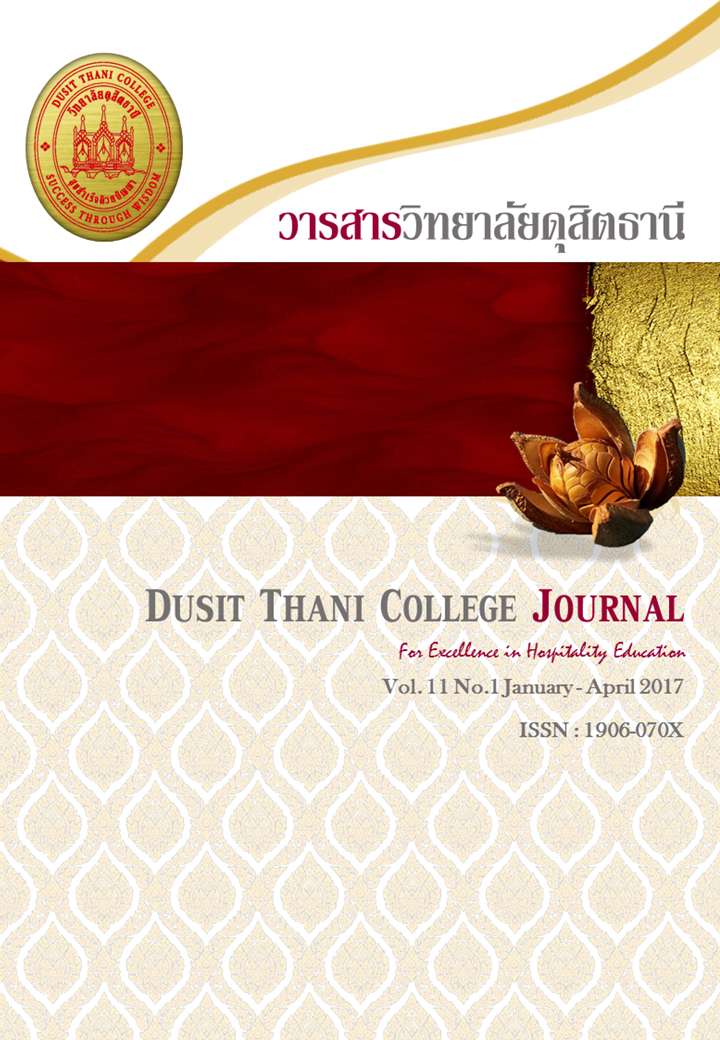การคุกคามทางเพศของผู้ปฏิบัติงานแผนกครัวในธุรกิจโรงแรม : ศึกษาผ่านมุมมองนักศึกษาฝึกงานวิทยาลัยดุสิตธานี
Main Article Content
บทคัดย่อ
การศึกษาในครั้งนี้มีวัตถุประสงค์เพื่อศึกษาสภาพปัญหา และผลกระทบที่เกิดจากการคุกคามทางเพศของนักศึกษาฝึกงานแผนกครัวในธุรกิจโรงแรมที่ถูกคุกคามทางเพศ และศึกษาแนวทาง การป้องกันและแก้ไขปัญหาการคุกคามทางเพศในที่ทำงานตามทัศนะของนักศึกษาฝึกงานแผนกครัวในธุรกิจโรงแรมที่ถูกคุกคามทางเพศ โดยเป็นการศึกษาเชิงคุณภาพ เก็บข้อมูลโดยการสัมภาษณ์เชิงลึกจากนักศึกษาวิทยาลัยดุสิตธานีที่ฝึกงานในธุรกิจโรงแรมในปีการศึกษา 2556 จำนวน 10 คน ผลการวิจัยพบว่า ปัญหาการคุกคามทางเพศที่เกิดขึ้นในแผนกครัวของธุรกิจโรงแรมเกิดขึ้นไม่บ่อยนัก ผู้ที่ถูกคุกคามทางเพศส่วนใหญ่เป็นนักศึกษาฝึกงานมากกว่าพนักงาน ผู้ที่คุกคามทางเพศส่วนใหญ่จะเป็นแค่ระดับพนักงาน ลักษณะของการคุกคามทางเพศที่เกิดขึ้นบ่อยที่สุด คือ การคุกคามด้วยวาจา ผลกระทบที่เกิดจากการถูกคุกคามทางเพศ คือ มีผลต่อสภาพจิต เกิดความเครียด ความกลัว และความอึดอัด นอกจากนั้นยังส่งผลกระทบต่อการปฏิบัติงาน คือ ไม่อยากไปปฏิบัติงาน สำหรับแนวทางในการป้องกันและแก้ไขปัญหาการคุกคามทางเพศตามทัศนะของนักศึกษาฝึกงานนั้น แบ่งออกเป็น 3 กลุ่ม คือ ตัวนักศึกษาฝึกงานจะต้องรู้จักการวางตัวให้เหมาะสม รวมทั้งต้องแก้ไขปัญหาอย่างถูกวิธีในกรณีที่เกิดปัญหาดังกล่าวขึ้น สถาบันการศึกษา ต้องมีการให้ความรู้ ความเข้าเกี่ยวกับปัญหาการคุกคามทางเพศก่อนส่งนักศึกษาออกไปฝึกงาน และมีมาตรการในการดำเนินการหากปัญหาดังกล่าวเกิดขึ้นกับนักศึกษาฝึกงาน ส่วนองค์กรที่รับนักศึกษาฝึกงานต้อง ต้องมีแนวทางในการป้องกัน โดยการให้ความรู้ความเข้าเกี่ยวกับปัญหาการคุกคามทางเพศ ผ่านช่องทางต่าง ๆ ให้กับพนักงาน และนักศึกษาฝึกงาน และหากปัญหาดังกล่าวเกิดขึ้นจะต้องดำเนินการกับผู้ที่คุกคามทางเพศอย่างจริงจัง
Article Details
นโยบายการพิจารณากลั่นกรองบทความ
- บทความวิจัยและบทความวิชาการทุกเรื่องที่จะได้รับการตีพิมพ์ต้องผ่านการพิจารณากลั่นกรองโดยผู้ทรงคุณวุฒิ (Peer Review) ในสาขาที่เกี่ยวข้อง จำนวน 3 ท่าน/บทความ
- บทความ ข้อความ ภาพประกอบและตารางประกอบที่ลงตีพิมพ์ในวารสารเป็นความคิดเห็นส่วนตัวของผู้เขียน กองบรรณาธิการไม่จำเป็นต้องเห็นด้วยเสมอไป และไม่มีส่วนรับผิดชอบใด ๆ ถือเป็นความรับผิดชอบของผู้เขียนแต่เพียงผู้เดียว
- บทความที่จะได้รับการตีพิมพ์จะต้องไม่เคยตีพิมพ์ เผยแพร่ที่ใดมาก่อน และไม่อยู่ระหว่างการพิจารณาของวารสารฉบับอื่น หากตรวจสอบพบว่ามีการตีพิมพ์ซ้ำซ้อน ถือเป็นความรับผิดชอบของผู้เขียนแต่เพียงผู้เดียว
- บทความใดที่ผู้อ่านเห็นว่าได้มีการลอกเลียนหรือแอบอ้างโดยปราศจากการอ้างอิง หรือทำให้เข้าใจผิดว่าเป็นผลงานของผู้เขียน กรุณาแจ้งให้กองบรรณาธิการวารสารทราบจะเป็นพระคุณยิ่ง
เอกสารอ้างอิง
Bravo, E. and Cassedy, E. (1992). The 9 to 5 Guide to Combating Sexual harassment. New York: John Wiley & Son Inc.
Department of Labour protection and welfare. Labour Protection Act B.E. 2541. (Online). Available :
http://www.labour.go.th/th%20/index.php/labour-laws/6282-2556-06-28-07-06-48, Retrieved : March 10, 2014.
Department of Labour protection and welfare. Labour Protection Act B.E. 2551. (Online). Available :
http://www.labour.go.th/th%20/index.php/labour-laws/6282-2556-06-28-07-06-48, Retrieved : March 10, 2014.
Gillbert, D., Guerrier, Y., and Guy, J. (1998). Sexual harassment issues in the hospitality industry. International Journal of Contemporary Hospitality Management. 10, 2 : 48-53.
International Labour Organization. (2014). Sexual Harassment at work. (Online). Available : http://www.ilo.org/wcmsp5/groups/public/---ed_norm/---declaration/documents/publication/wcms_decl_fs_96_en.pdf, Retrieved : March 13, 2014.
Mackinnon, A. C. (1979). Sexual harassment of working women. 2nd ed. New Haven: Yale University Press.
Powell, G. N. (1993). Women and men in management. 2nd ed. Newbery park, CA: Sage.
Yeung, S. (2004). Hospitality Ethics Curriculum: an Industry Perspective. International Journal of Contemporary Hospitality Management. 16,4 : 25-262.


